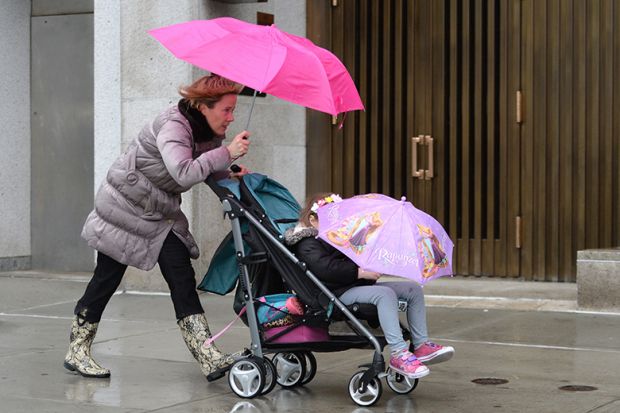Mothers working in academia often deliberately hide or underestimate their parental responsibilities in the face of workplace pressure, according to research.
The study says that demands for university staff to appear constantly productive are particularly challenging for academics with caregiving responsibilities and, drawing on interviews with 32 UK-based academic mothers about their experience of the transition to parenthood, it introduces the concept of “care obfuscation” as a coping mechanism.
“Care obfuscation refers to the practice of concealing, underestimating or denying the impact of caregiving responsibilities on professional obligations,” says the paper, published in Higher Education.
“The silencing of academic caregivers begets further silencing, to the extent that academic mothers become colluders in their own exclusions and (in)visibilities.”
Almost all of the 32 interviewees had employed at least one type of obfuscation to navigate the conflicting demands of their careers and caregiving responsibilities.
When asked by a supervisor to hold an event, Claire, a PhD student in the social sciences, said: “The others say yes and do whatever and I don’t want to be the one who says no because I feel like then I am using my child as an excuse…but I can’t do it, but I will still say yes and then I work it out later.”
The mothers in the survey reported struggling with exhaustion but did not disclose this to their employers or colleagues because they were worried it would hurt their careers. Instead, they felt it was normal to “get on with it”.
According to the study, obfuscation can help academic mothers project the image of the “ideal worker” and offer temporary relief from the emotional challenges that come from conflicting professional and personal expectations.
However, it warns that the strategy is not an effective long-term solution, adding: “Lies may be exposed, and overcommitting can backfire.”
Author Mollie Etheridge, a sociology lecturer at Anglia Ruskin University, said that the divide between home and work life can foster unrealistic expectations for some, but “feel like a lifeline” for others.
While roving researcher schemes have been used as a form of maternity cover in some institutions, Etheridge said they are “troubling” because they ignore the often unpredictable first few months of returning to work.
“Becoming a parent is a lengthy and ongoing process, not one that begins and ends with care leave,” she told Times Higher Education.
“Ultimately, I’m unconvinced that the answer to the sense of exclusion that parents feel is to try and help them keep up with the current and expected rate of output.”
She urged policymakers and research managers to adopt systems to allow parent academics to reduce their academic momentum if they so wished without facing long-term negative consequences.
However, she admitted that the deeply rooted linking of academic success and productivity posed a significant challenge.
Register to continue
Why register?
- Registration is free and only takes a moment
- Once registered, you can read 3 articles a month
- Sign up for our newsletter
Subscribe
Or subscribe for unlimited access to:
- Unlimited access to news, views, insights & reviews
- Digital editions
- Digital access to THE’s university and college rankings analysis
Already registered or a current subscriber?








